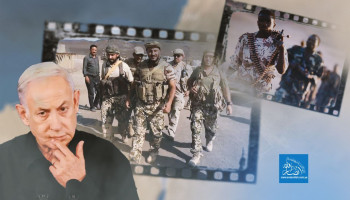Questions are being raised within the Israeli occupation entity in Palestine about the recent Yemeni missile attack on occupied Yaffa, which disintegrated into fragments and posed a serious challenge to the enemy’s defense systems.
The Yemeni missile reminded the Zionists of Iranian projectiles that once struck deep inside the occupied territories, including fragmentation missiles that caused massive destruction in the enemy’s settlements. This development has intensified Israeli fears that Yemen has entered a new phase—deploying such advanced weaponry against occupied Yaffa and other settlements, complicating interception efforts to an unprecedented degree.
While Zionist media outlets and research centers are now preoccupied with analyzing Yemen’s fragmentation missiles, Yemen itself had openly announced this capability months ago, prior to the Zionist aggression against the Islamic Republic of Iran. At the time, an official source in Yemen’s Ministry of Defense revealed that the country possessed missiles with multiple warheads designed to separate if intercepted, striking additional targets and rendering the enemy’s defense systems ineffective.
Reaffirming this stance, the head of Yemen’s Supreme Political Council, Marshal Mahdi Al-Mashat, issued a statement urging companies investing in the occupied territories to take Yemeni warnings seriously and leave immediately, stressing that the situation in occupied Palestine is no longer safe.
Despite such clear warnings, the Israeli occupation dismissed them, treating Yemen with the same disregard it showed when the Yemeni front first declared its support for Gaza following the “Al-Aqsa Flood” operation on October 7, 2023. Today, however, the enemy faces the undeniable reality of this threat and recognizes that the Yemeni front has become a decisive force undermining its regional expansionist agenda.
Yemen has once again demonstrated that it does not rely on empty rhetoric or media spectacle. Instead, it pursues carefully coordinated strategies, advancing from one stage to the next with precision, unsettling its adversaries and forcing them into retreat. The Yemeni leadership acts with wisdom and foresight, avoiding major escalations unless fully prepared for all scenarios, including potential retaliatory airstrikes by the Zionist entity against Sana’a and other provinces.
In this context, President Al-Mashat’s past statement deserves renewed attention—his declaration that Israeli warplanes used in aggression against Yemen would become “a source of mockery.” He asserted that Yemen’s air defenses would strip the occupation’s aircraft of their prestige, turning them into objects of ridicule.
This prediction has begun to materialize. The Israeli enemy has struggled to penetrate Yemeni airspace, particularly during its last two attempted raids. Yemeni air defenses successfully pursued the hostile aircraft, forcing them to withdraw without achieving their objectives.
Thus, a new reality is emerging: Yemen is exerting immense pressure on the Israeli occupation to halt its genocidal war on Gaza. Fragmentation missiles have become a major source of fear and a nightmare for the Zionists. Zionist media admits this growing concern. For example, the "Jerusalem Post" recently acknowledged that Yemen’s use of such missiles expands the scope of the threat, complicates interception, and makes post-impact management far more difficult. The paper further warned that these missiles significantly undermine the effectiveness of the entity’s missile defense systems, including the Arrow and David’s Sling, which are ill-equipped to counter multiple warhead projectiles.
Yemen today stands as the only Arab nation directly confronting the Zionist entity on equal footing—refusing violation of its sovereignty or silence in the face of aggression. Each Israeli strike on Yemen is met with even more powerful retaliation against the occupation’s settlements, leaving enemy leaders grappling with the complexity of the Yemeni front. The enemy now faces two grave threats: first, Yemen’s hypersonic and fragmentation missiles, and second, the growing risk of losing its most advanced aircraft, including F-35 stealth jets, to Yemeni air defenses—a scenario that would deal the occupation a humiliating blow if even a single plane were downed.
These are heavy scenarios for the Israeli entity to bear. The Yemeni front—once underestimated—has now become a source of hope and inspiration for freedom-seekers worldwide in the struggle to alleviate Palestinian suffering. According to current developments, Zionists fear the surprises Yemen may yet unleash, which could prove decisive in halting the aggression and ending the siege on Gaza.







